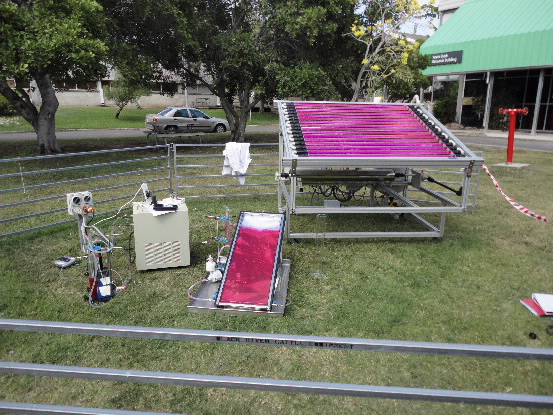Media Releases
Scientists find more use for crops

First published 30 November, 2012
North Queensland sugarcane and essential oil derivatives could be turned into pharmaceuticals, agrochemicals and even luxury perfume, in ground-breaking research by James Cook University researchers.
Matthew Bolte, from JCU’s Solarchemicals Research Group in the School of Pharmacy and Molecular Sciences, is using sunlight to photo-chemically convert biomass derivatives into materials that are both naturally derived and produced with renewable energy.
“We are investigating a way to take advantage of JCU’s tropical location and sustainable derivatives from the sugarcane and the essential oil industry,” Mr Bolte said.
“As a result we are developing a safe, energy-efficient and cost-effective, environmentally friendly method for the conversion of several North Queensland biomass derivatives or natural products.”
Mr Bolte said the Solar Chemicals Research Group, headed by JCU’s Associate Professor Michael Oelgemoeller, was responding to current challenges in the sugar industry.
“Environmental and economic pressures on the sugar industry has caused them to diversify,” he said.
“The production of ethanol from sugarcane biomass is one such response. However, a recent report from the Rural Industries Research and Development Corporation points the sugar industry to the development of products based around furfural.”
Furfural is a sugarcane bagasse derivative and is used worldwide in the plastics and paint industry to replace chemicals currently derived from fossil fuels.
A furfural plant was being constructed alongside the Proserpine Mill, and the project’s ultimate aim was for a solar reactor to be also set up at Proserpine to use the furfural on site, Mr Bolte said.
Similar pressures to the sugar industry were being placed on the essential oil and fragrance industries, with many perfume houses and customers demanding more environmentally-friendly ingredients, he said.
Mr Bolte said the team’s first project was converting furfural to a higher value platform chemical, 5-hydroxy furanone.
“This can then be used as a building block for biodegradable surfactants, agrochemicals and pharmaceuticals,” he said.
“The second project is focused on the conversion of the essential oil citronellol, from the Lemon Scented Gum, to the higher-value, natural fragrance rose oxide. This fragrance is used in well-known high end floral perfumes.”
Mr Bolte said the sustainability credentials of the project were further enhanced in that all the solar chemistry had been developed to be carried out in the renewable solvent ethanol.
Work began in the laboratory in June this year and projects have moved from laboratory scale (500mls) to a small scale manufacturing size in a 50L purpose-built solar reactor.
“We are hoping to improve the process on the 50-litre scale to enhance the economic and environmental viability of the concept.
“We see a collaborative partnership with the sugar and essential oils industry as the obvious next step.”
Mr Bolte said the project, funded by a JCU Pathfinder Grant, was breaking new ground in the Australia green chemical market.
“Through this work JCU is realising its potential to have a significant, long-term positive impact on society and the students working in this group are being exposed to learning experiences that maximise their opportunities to graduate as sustainability-literate citizens.”
For interviews, contact Matthew Bolte on (+617) 4723 4790 or on 0437 559 047. Email: mlbolte@bigpond.net.au
JCU Media contact: Caroline Kaurila (07) 4781 4586 or 0437 028 175